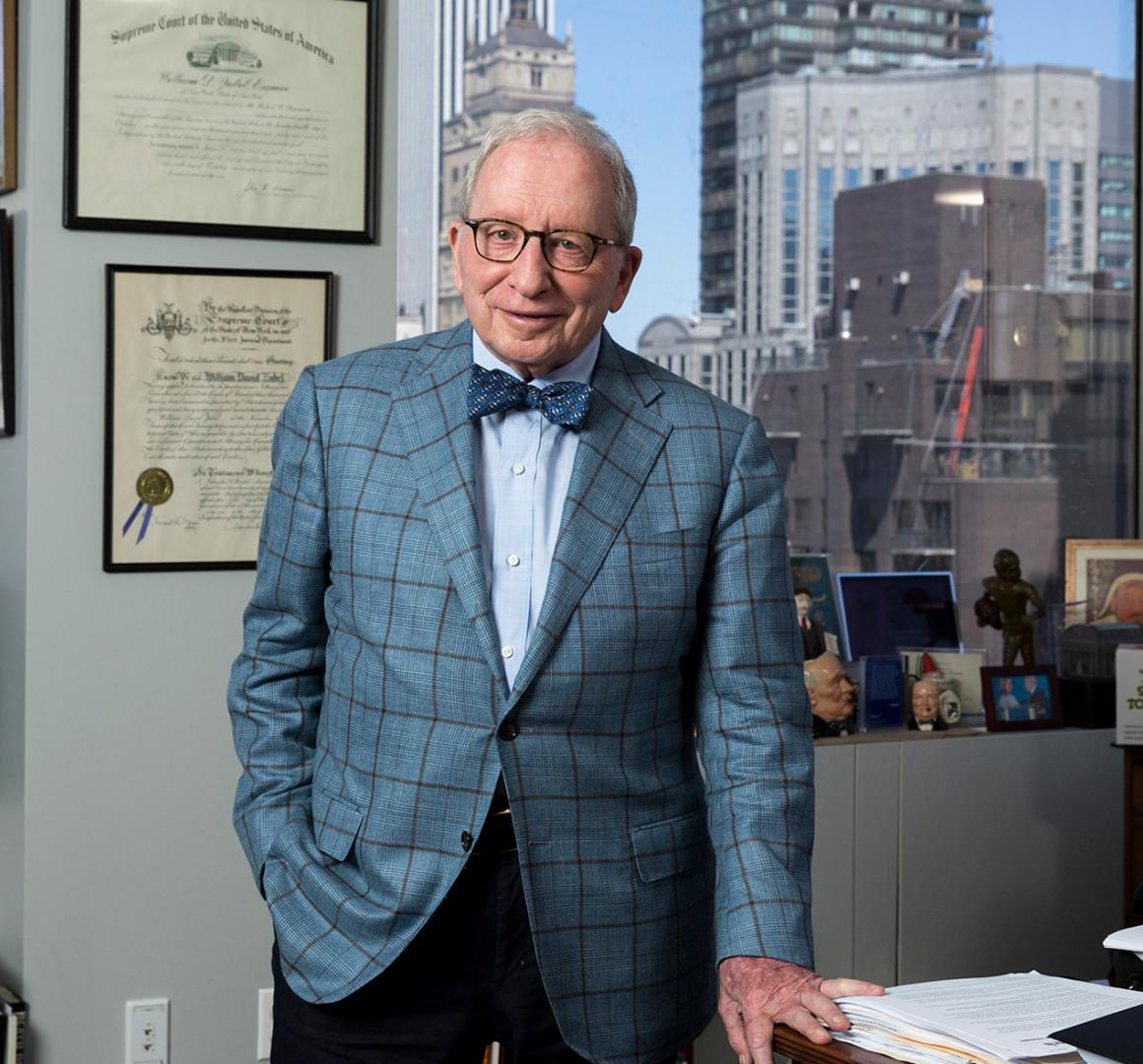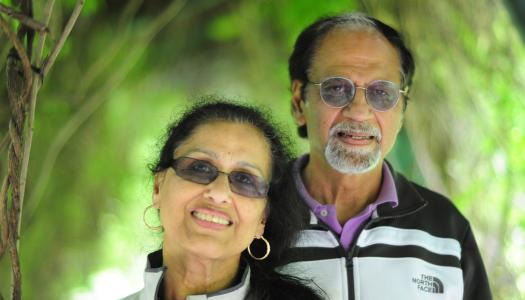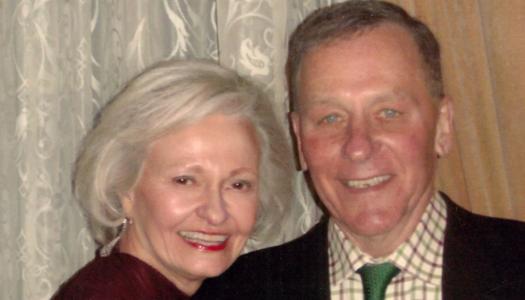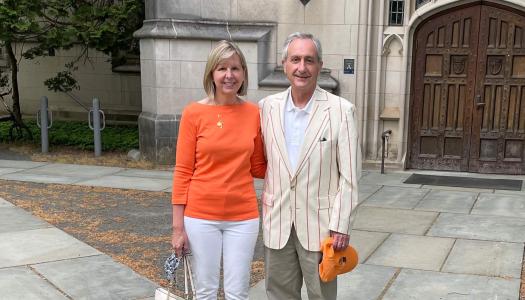After a lifetime of social justice advocacy, a gift honoring Bill Zabel ’58 will establish a named professorship

Photo by Steve Freeman
Bill Zabel ’58 has played an outsized role in some of this century’s most seminal civil rights moments, which isn’t something you would expect from a trust and estates lawyer. In his day job, he is known for his ability to provide sound counsel to wealthy individuals seeking to protect their assets. Since co-founding Schulte Roth & Zabel in 1969, he has shaped the firm into a reliable advisor to high-profile clients like George Soros, Greg Norman and Howard Stern. “I’m never going to retire,” he said. “I’m addicted to the law.”
In a career spanning 62 years, Zabel also has made a significant mark as an advocate for social justice. From spending the summer of 1964 in Mississippi as a volunteer civil rights lawyer helping to expand Black voting rights to writing the American Civil Liberties Union’s lead brief in the landmark Loving v. Virginia case, which led to a unanimous 1967 Supreme Court ruling striking down laws prohibiting interracial marriage, he has employed his legal acumen to bend the arc of the moral universe towards justice. “I’m most proud of Loving v. Virginia because that goes in the history books,” Zabel said. “Interracial marriage was still a crime in 19 states when we brought that case.”
In the process of taking on so many monumental and closely watched cases, Zabel has developed a practice that he leverages to advance the public good. Case in point: Schulte Roth & Zabel is currently pursuing a legal action involving the survivors of the 1921 Tulsa race massacre, one of the worst episodes of racial violence in American history, which left 300 Black residents dead, at least 8,000 homeless and nearly 1,500 homes in Tulsa’s Greenwood community, also known as “Black Wall Street,” burned or looted. The lawsuit by the last two living survivors, who are 108 and 109 years old, has been appealed to the Oklahoma State Supreme Court. Zabel has 25 of the firm’s lawyers working the case pro bono. “If we don’t win this appeal, the community will never get reparations for the damages from the massacre,” he said. “I think we’ll win, but it’s a tough case with a big statute of limitations problem.”
Honoring his Legacy
In recognition of his lifetime of work, the JPB Foundation made a gift to Princeton that established the William D. Zabel ’58 Professorship of Human Rights to attract and retain world-class faculty pursuing academic work related to social justice. “I represented the foundation in several lawsuits,” Zabel said. “And they wanted to do something in my honor.”
Barbara Picower, the JPB Foundation’s co-founder, has been a longstanding client of Zabel’s even before he helped negotiate a $7.2 billion settlement between the U.S. government and the estate of her husband, philanthropist Jeffry Picower, a longtime investor with Bernie Madoff. The settlement allowed the victims of Madoff’s Ponzi scheme to be compensated. “It was the largest civil settlement in United States history at the time,” Zabel said.
In 2018, Zabel personally endowed a professorship in human rights at Harvard, where he received his law degree in 1961. Samantha Power, former U.S. ambassador to the United Nations under President Obama and current administrator of the United States Agency for International Development (USAID), was named the first recipient in 2019.
The two professorships in Zabel’s name both recognize and continue his long tradition of giving back in recognition of the significant role Princeton has played in his family. His brother Sheldon ’63, sons Richard ’83 and David ’88 and granddaughter Anna ’19 have all graduated from the University. He is a longtime member and former chair of Princeton’s Planned Giving Advisory Council, where he freely shares his decades of expertise on estate planning and charitable giving. Zabel is also a member of the 1746 Society, joining others who have included Princeton in their legacy plans.
And he has quite a legacy.
Early Activism
Growing up in Sioux Falls, South Dakota, Zabel’s commitment to human and civil rights was shaped by his parents, Russian immigrants who were politically active. “[Senator] George McGovern was a good friend of my parents and used to come for dinner,” he said. “He once took me to the Sioux Indian Reservation in Pine Ridge. I saw how brutally they were treated and it stuck with me.”
His compassion for others sharpened into activism at Princeton, where Zabel was the only student in his class from South Dakota. He attended what was then the Woodrow Wilson School, studying under politics professor H.H. Wilson. “He was a real liberal, so much so that [Senator Joseph] McCarthy had questioned his loyalty to America,” Zabel said. “Still, he strongly influenced me toward progressivism.”
He was also part of a regular lunch crew of other firebrands such as Ralph Nader ’55, Ralph Schoenman ’57 and Johnny Apple ’57. They bonded over the bicker controversy that grew out of 23 students (of whom 13 were Jewish) not receiving bids from any of the University’s eating clubs. “I got into the politics from bicker and while on campus helped campaign for the 100% rule, which made sure every student was accepted into an eating club,” Zabel said.
During the summer of Zabel’s sophomore year, Emmett Till, a Black 14-year-old, was tortured and lynched by two white men, who were quickly acquitted by an all-white jury in the ensuing trial. Till’s murder would be one of the major sparks that lit the fire of the Civil Rights Movement, particularly after magazines and newspapers across the country circulated pictures of Till’s mother standing over his mutilated body.
“My roommate and I were so incensed by the verdict we started a petition urging the Justice Department to bring up federal action against his murderers,” Zabel said. “It received a lot of attention, partly because one of the signatories was Albert Einstein, who was at the Institute for Advanced Study at the time.”
In the summer of 1964, Zabel was harassed, threatened and shot at by Ku Klux Klan members while he worked to release Black voters in Mississippi who had been jailed simply for registering to vote. He narrowly escaped death several times but three of his young civil rights co-workers — Andrew Goodman, James Chaney, Michael Schwerner — were murdered by local Klansmen.
Still Fighting the Good Fight
Winston Churchill has been a personal hero ever since Zabel interviewed him for his senior thesis. He’s an avid collector of Churchill memorabilia (including the famous Yousef Karsh photograph) and even attended the legendary British leader’s state funeral in 1965. “I wrote my thesis about why Churchill lost the election of 1945 after winning World War II,” he said, adding that he had received a fellowship to travel to Britain and work on it during his junior year. “I got 20 minutes with him at his desk in the House of Commons.”
When Zabel sat down for the interview, Churchill told him that he hated the topic and didn’t want to talk about it. Thinking quickly, Zabel pivoted to ask Churchill how he was able to get back into power by 1951. “He said, ‘Now that’s a very good question,’ and for the next 20 minutes he talked about how great he was in coming back to be prime minister again in 1951.”
Churchill was 81 by then, a fact that isn’t lost on the 87-year-old Zabel. “People keep asking me why I’m still working,” he said. “I’m here because the law still excites me, and we do these good things from time to time.” He’s also quick to point out that Churchill won the Nobel Prize for Literature when he was 83, in part for “his brilliant oratory in defending exalted human values.”
Zabel continues to defend human rights as board chair for the Immigrant Justice Corps, which offers fellowships to recent law graduates committed to providing immigration legal services, and he previously chaired Human Rights First, a nonprofit he helped establish to advance social justice issues, for more than 20 years.
Zabel says he’s proud of all the pro bono work done by his law firm “I’m the only co-founder of this firm still practicing,” he said. “One is a consultant at a big corporation and the other retired to California. That isn’t me – they’ll have to carry me out on a stretcher.”


